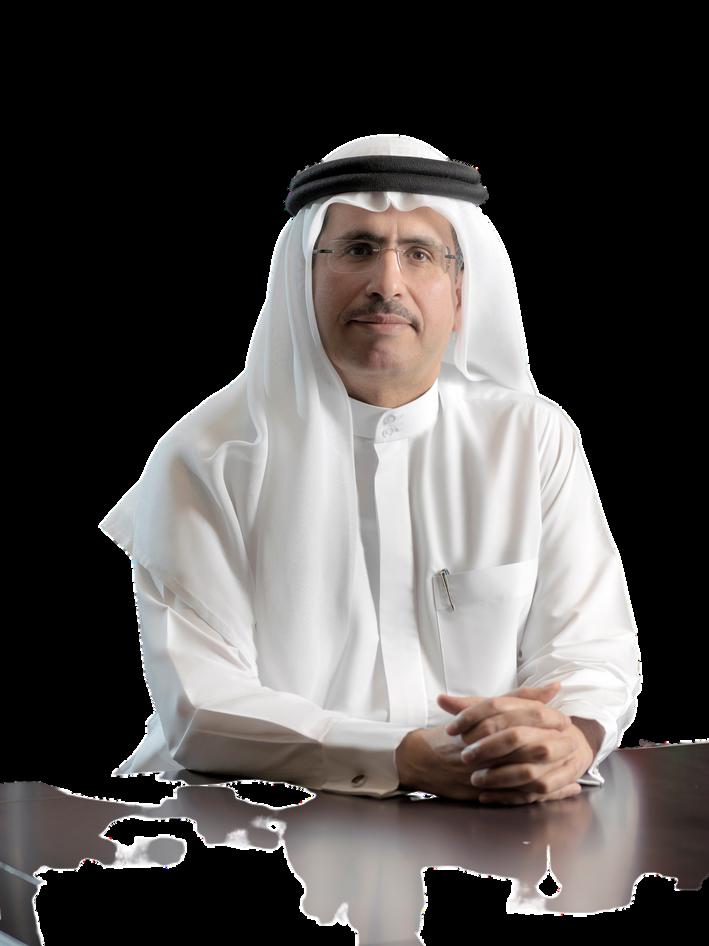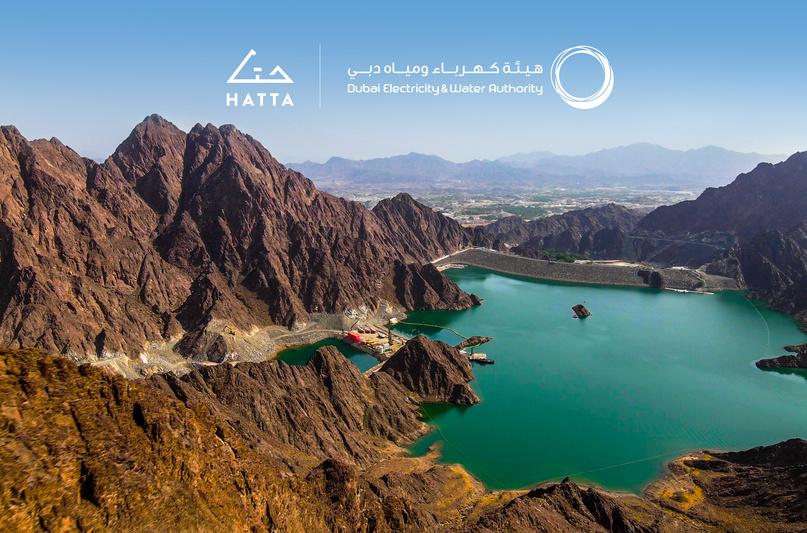
5 minute read
HESaeed Mohammed AlTayer
MD & CEO, DEWA
Key Highlights
Advertisement
We are implementing major development projects and strategic initiatives to achieve the Dubai Clean Energy Strategy 2050 and the Dubai Net Zero Emissions Strategy 2050 to provide 100% of the energy production capacity from clean energy sources by 2050.
We are implementing a 250MW pumpedstorage hydroelectric power plant in Hatta, which is the first of its kind in the Arabian Gulf region.
DEWA launched the DEWA-SAT1 nanosatellite, in cooperation with NanoAvionics, becoming the first utility in the world to use nanosatellites to improve operations, maintenance and planning of electricity and water networks
QWhat do you have to say about the present scenario of the Dubai solar market? How do you see it evolving?
The production capacity of the clean energy in Dubai has reached 2,127 megawatts (MW) using photovoltaic solar power (PV) and concentrated solar power (CSP) This is about 14 6 percent of Dubai’s total power production capacity of 14,617 MW. Additionally, there are 733 MW of ongoing solar project in the Mohammed bin Rashid Al Maktoum Solar Park.
We strive to keep pace with demand by implementing pioneering projects to diversify sources of energy production to include various clean and renewable energy technologies and sources available in Dubai We are implementing major development projects and strategic initiatives to achieve the Dubai Clean Energy Strategy 2050 and the Dubai Net Zero Emissions Strategy 2050 to provide 100% of the energy production capacity from clean energy sources by 2050
We are implementing several leading projects to diversify clean energy sources These include multiple clean and renewable energy sources and technologies such as photovoltaic (PV) panels, Concentrated Solar Power (CSP), and green hydrogen production using solar power Among the most prominent of these projects is the Mohammed bin Rashid Al Maktoum Solar Park, the largest single-site solar park in the world, using the Independent Power Producer (IPP) model with a production capacity of 5,000 MW by 2030
We are also encouraging our customers through the Shams Dubai initiative to install photovoltaic solar panels on the roofs of their buildings and facilities to meet part of their energy needs By the end of 2022, the total installed capacity of the initiative reached 500MW
We are sure that the Dubai solar market will continue its steady positive growth

QDo you think Dubai is on the right path to achieving net zero by 2050? What are some steps to be taken in this regard?
Dubai is definitely on the right path to achieving net zero by 2050 In DEWA, we have already updated our strategic plan to focus on ensuring net-zero by 2050 and supporting the circular economy. We are working to diversify energy sources in Dubai through pioneering projects that include clean and renewable energy technologies available in Dubai
We are implementing a 250MW pumpedstorage hydroelectric power plant in Hatta, which is the first of its kind in the Arabian Gulf region It will use the stored water in Hatta Dam and will have a production capacity of 250 MW and a storage capacity of 1,500 megawatt-hours In light of the importance of green hydrogen in the transition to net-zero, we have implemented the Green Hydrogen project in the solar park It is the first of its kind in the Middle East and North Africa to produce green hydrogen using solar energy It stores the hydrogen and then converts it back into electrical energy in addition to other uses in the air, land, and sea transport as well as in industry.
We have participated in establishing the largest district cooling company in the world District cooling uses 40% less energy To promote green mobility, we launched the Green Charger initiative to establish a state-ofthe-art infrastructure for electric vehicles that currently has over 350 charging stations using the latest smart and innovative technologies to provide a seamless experience for users Implementing the Dubai Demand Side Management Strategy contributed to reducing electricity consumption in Dubai by 17% per capita and water consumption by 21% per capita compared to 2010. This contributed to avoiding over 14 million tonnes of CO2 emissions in between 2011 and 2021. To enhance operational efficiency and effectiveness of electricity and water networks, we launched ‘DEWA SAT-1’ nanosatellite as part of DEWA’s space programme (Space-D) This year we will launch DEWA SAT-2 nanosatellite DEWA is the first utility in the world to use nanosatellites in its operations We also make use of big data through sensors in solar power stations that gather real-time data and analyse it in conjunction with data from DEWA’s satellites
For many years now in Dubai, we have stopped launching new projects to produce energy using fossil fuels, and restrict new water desalination projects to the more energy-efficient reverse osmosis technology using clean energy, in addition to raising fuel efficiency in the main production units to about 90%, competing with the highest international benchmarks
QHighlight the major achievements of DEWA in 2022.

Financial Achievements:
In 2022 DEWA achieved its record standalone 2022 net profit of AED 11 1 billion and increased the 2022 dividend pay-out to its shareholders by 60% to AED 9 90 billion
In April 2022, DEWA was listed as a public company on the Dubai Financial Market This was the largest IPO in the UAE, and the largest utility IPO globally since 2008 Further DEWA’s majority-owned subsidiary, EMPOWER, listed on the Dubai Financial Market as a public company in November 2022 DEWA is the only entity in the region to have listed both itself and its subsidiary in the course of the same year
Technical Achievements:
During 2022, DEWA commissioned two 400 kV substations, fifteen 132 kV substations and 1,113 11-6 6 kV substations DEWA has also deployed 1,108,530 smart electricity meters and 996,917 smart water meters By the end of 2022, the company installed an additional 1,100 MW of generation capacity, representing an 8 2% increase
The Mohammed bin Rashid Al Maktoum Solar Park

In 2022, DEWA added 200 Megawatts of parabolic trough concentrated solar power energy from the 4th Phase of Mohammed bin Rashid Al Maktoum Solar park which is currently in progress, The 4th phase is 950MW with the largest investment project in the world that combines Concentrated Solar Power (CSP) and photovoltaic solar power (PV) with investments of AED15 78 billion DEWA also added 600 megawatts of photovoltaic solar energy, from the 5th phase of the Mohammed bin Rashid Al Maktoum Solar Park The 5th phase is currently underway, with a total capacity of 900MW and investments of AED 2 058 billion The current production capacity of the solar park is 2,127 megawatts (MW) This is about 14 6% of Dubai’s energy mix
Launching the 3U nanosatellite DEWASAT1
In January 2022, DEWA launched the DEWASAT1 nanosatellite, in cooperation with NanoAvionics, becoming the first utility in the world to use nanosatellites to improve operations, maintenance and planning of electricity and water networks The launch came as part of the DEWA’s Space Dprogramme, which includes the launch of nanosatellites developed by Emiratis at DEWA’s Research and Development Centre DEWA also launched an independent Ground Station capable of tracking and communicating with DEWA’s satellites at their low Earth orbit of 400700 kilometres
New Guinness world records
DEWA has achieved a number of Guinness World Records
In 2022, DEWA has marked another breakthrough by achieving the Guinness World Records title for the second time for owning and managing the Largest Single-Site Water Desalination Facility in the world with a production capacity of 490 MIGD, which is equivalent to approx 2 2 million cubic meters per day This is the second world record for DEWA’s Jebel Ali Power Generation & Water Production Complex In 2021, the Complex was confirmed by Guinness World Records as the Largest Single-site Natural Gas Power Generation Facility in the world
In 2022, DEWA’s Moro Hub also achieved the Guiness record as world’s largest solar data centre, among other Guiness records received by DEWA
World-leading results of DEWA’s main KPIs:
In 2022, DEWA achieved a number of worldclass KPI results, surpassing best European and American peers:
DEWA recorded the world’s lowest average annual Customer Minutes Lost (CML) of 1 19 minutes per customer DEWA reduced the line losses of the electricity transmission and distribution network to 2 2%, one of the lowest worldwide DEWA reduced the line losses of the water transmission and distribution network to 4 5%, one of the world’s lowest
Awards:
DEWA won 26 prestigious local, regional, and international awards in 2022, which raised DEWA’s total awards between 2015 and 2022 to 410 awards (68 local, 69 regional, and 273 global)







